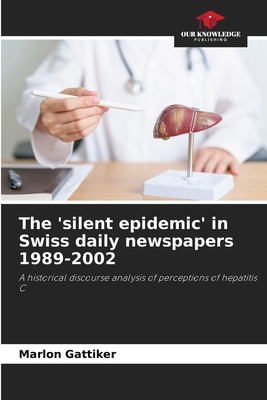
- We will send in 10–14 business days.
- Author: Marlon Gattiker
- Publisher: Our Knowledge Publishing
- ISBN-10: 6208578620
- ISBN-13: 9786208578626
- Format: 15.2 x 22.9 x 0.6 cm, minkšti viršeliai
- Language: English
- SAVE -10% with code: EXTRA
The 'silent epidemic' in Swiss daily newspapers 1989-2002 (e-book) (used book) | bookbook.eu
Reviews
Description
Hepatitis C affects around 32,000 people in Switzerland, but a third of them are unaware of their infection. This "silent epidemic", as the WHO calls it, often goes unnoticed for years and has life-threatening long-term consequences such as liver cancer. This study is the first to take a comprehensive look at the perception of hepatitis C in Switzerland between 1989, when the virus was discovered, and 2002, the year after the national prevention campaign was launched.Using discourse analysis of newspaper articles, archive sources and medical history documents, the work shows how medical knowledge, the blood donation scandal and intravenous drug use shaped public discourse. Stylistic devices such as war and shadow metaphors illustrate the dynamic between perception and stigmatization. The role of HIV as the dominant epidemic narrative and the resulting neglect of hepatitis C are critically examined.This book closes a gap in the history of the Swiss epidemic and makes an important contribution to historical and health policy research.
EXTRA 10 % discount with code: EXTRA
The promotion ends in 23d.18:50:30
The discount code is valid when purchasing from 10 €. Discounts do not stack.
- Author: Marlon Gattiker
- Publisher: Our Knowledge Publishing
- ISBN-10: 6208578620
- ISBN-13: 9786208578626
- Format: 15.2 x 22.9 x 0.6 cm, minkšti viršeliai
- Language: English English
Hepatitis C affects around 32,000 people in Switzerland, but a third of them are unaware of their infection. This "silent epidemic", as the WHO calls it, often goes unnoticed for years and has life-threatening long-term consequences such as liver cancer. This study is the first to take a comprehensive look at the perception of hepatitis C in Switzerland between 1989, when the virus was discovered, and 2002, the year after the national prevention campaign was launched.Using discourse analysis of newspaper articles, archive sources and medical history documents, the work shows how medical knowledge, the blood donation scandal and intravenous drug use shaped public discourse. Stylistic devices such as war and shadow metaphors illustrate the dynamic between perception and stigmatization. The role of HIV as the dominant epidemic narrative and the resulting neglect of hepatitis C are critically examined.This book closes a gap in the history of the Swiss epidemic and makes an important contribution to historical and health policy research.


Reviews